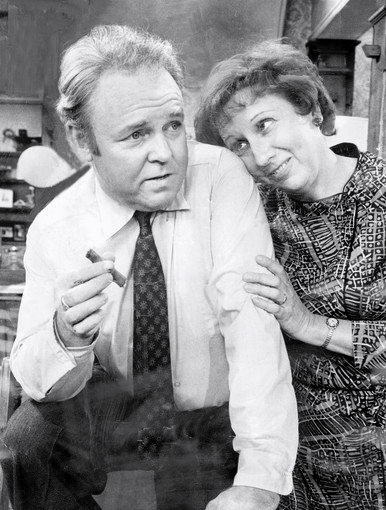At the height of her popularity in 1973, the actress wrote a piece for the religious magazine Guideposts that showed a different side of the woman we remember as Edith Bunker:
For myself, I have seen how my own niggling, personal prejudgments often have robbed me of pleasure and peace of mind. There have been times when I have tried to cure these prejudices, and I recall one time in particular when a conscious effort at healing resulted in a crucial breakthrough in my acting career.
It happened a long time ago, in the late ’40s, after a good many bleak years trying to crack Broadway. Those had been years of constant work, of having a job as a secretary in the shipping department of a railroad company by day; typing manuscripts late at night in exchange for drama lessons; begging time off for summer stock; making precious little progress.
Then one day the chance came to read for one of the Equity Library Theatre productions — shows that our actors union puts on to give us a chance to work and to be seen. The play was “The Corn Is Green,” and there were two roles in it I felt confident I could handle.
One of them was so miniscule, however, that though I knew it meant a job, there was some doubt as to whether it would be a good showcase. Naturally the tiny part was the one I was offered.
I thought about it a while. “I’ll do it,” I said finally, irritated that they hadn’t given me the larger part.
Ten days before the opening, the actress rehearsing Mrs. Watty fell on some ice and broke her leg. I assumed that I would inherit her role and I wasn’t surprised when Ted Post, the director, came to talk to me. He asked me if I would fill in until he could get somebody else.
“Somebody else! But what about me?” I protested. “I can play her.”
“No,” he said, “you’re too young.”
I didn’t believe him. He just was not being fair. He had it in for me.
I got angry. I got so mad that I couldn’t even sit at the same dinner table with my parents that evening. I had to get up and go to my room and try to collect myself. I had to do something about this injustice or I would burst.
In those days — as well as today — I had my own way of finding help when needed. I took out my Bible. After all, I had been going to Sunday school classes in our church since the age of two. And I also took out my concordance, that remarkable compilation of all the key words in the Bible and where they appear.
I flipped through the pages of the concordance to the “Js,” mumbling theatrically all the while, “Justice is what I need, justice…” But before I could find “justice” my eyes fell on “judge.”
“For the Lord is our j. Isa. 33:22.”
I picked up the Bible and sped to Isaiah. I had explored Scripture in this fashion many times before, sometimes losing myself for hours in random adventure. Now, Chapter 33 — there it was: “For the Lord is our judge, the Lord is our lawgiver, the Lord is our king; he will save us.”
What was this I was asking about justice? Had I jumped to some emotional conclusion about Ted? Should I pray about this and try leaving justice to the Lord?
I prayed; I relinquished the matter to the Highest Power. My anger disappeared. I was back in the dining room for dessert.
The next day at rehearsal I was no longer driven by an ambition to play Mrs. Watty. I read the part as well as I could and enjoyed doing it, and when Ted found somebody he thought was the right age, I retired with genuine grace.
But that wasn’t the end of the story. Three nights later the producer called me at home and said that the new Mrs. Watty hadn’t worked out. If Ted should ask me, would I be willing to take over? Very quietly I told her I’d be delighted, and the next day Ted said, “You’re too young for it, Jean, but the part’s yours.”
It’s still not the end of the story. Just as all show business sagas ought to unfold, an important agent saw me at the opening. She wasn’t fooled by my make-up. She saw me as a young woman, just right, she decided, for the role of the niece in a touring company of “Harvey.”
Out of that came my first good job in the theater. I was on my way.
Today, when I get emotional about something I think somebody has done to me, I try to think back to that experience before I start hurling a few hasty, bigoted thunderbolts.
I recall that I never succeeded in changing the director’s opinion of me; nor did I change my own opinion. I had simply left the judging to the Lawgiver, and He decided for both of us.
There’s more. Read it all.












